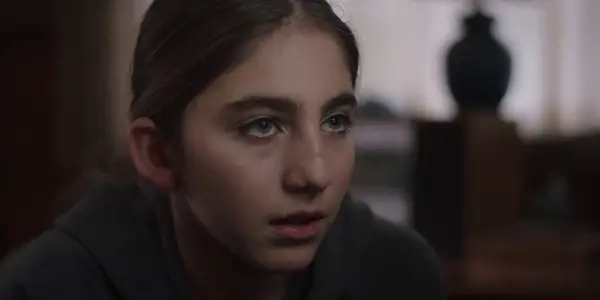Have you ever been tempted by violence? Have you looked around at the world, raging with war, and wondered if perhaps maybe violence was truly the only solution? Filmmaker Megan Griffiths’ latest feature, the coming-of-age drama Sadie, tells the story of a young girl who idolizes her soldier father to the point of trying to execute his battle tactics in her own world. However, as Sadie soon learns, what works in war doesn’t always work on the home front.
Childhood as Battleground
Sadie (Sophia Mitri Schloss) is a teenage girl living in a trailer park with her mother, a hardworking nurse named Rae (the forever criminally underrated Melanie Lynskey). Sadie’s father has been serving overseas in the military for several years; in Rae’s eyes, he’s a deadbeat dad signing on for additional tours just to avoid responsibility back home, but to Sadie, he is a glorious hero who regularly writes her letters detailing his various exploits. (Rae, however, has not received a letter or a phone call from her husband in years.)

To feel closer to her absent father, Sadie harbors an almost unhealthy obsession with the military that begins to carry over into her regular life, with increasingly disturbing results. It’s clear that Sadie has become so desensitized to violence that she can’t entirely comprehend its impact. When her friend and neighbor, Francis (Keith L. Williams) is bullied by a jock at school, Sadie first frames the jock for a bomb threat and then brings a gun to school to intimidate him.
When she writes an essay about her admiration for her father, completely with graphically violent details of how she and her father would team up to “kill all the enemies” together, the kindly school counselor, Bradley (Tony Hale, perfectly cast), brings her into his office for questioning. That Bradley is carrying on an awkward almost-relationship with Sadie’s mother doesn’t help matters. Sadie accuses him of being a coward, talking up her father’s bravery in contrast.
However, it’s not Bradley who poses the real threat to the happy family fantasy Sadie still believes will come to fruition once her dad finally returns home. That would be new neighbor Cyrus (John Gallagher Jr.), a former pilot addicted to painkillers due to an untreated back injury leftover from a bar fight. Despite this less than stellar character reference, Rae falls for Cyrus almost instantly, much to Sadie’s chagrin. He might deeply care for her mother, but in Sadie’s eyes, Cyrus is the enemy. And as her father taught her, the enemy must be dealt with by any means necessary.
The Violence of Heartbreak
Once Sadie mercilessly sets her sights on getting Cyrus out of her mother’s life, the film takes increasingly dark turns, turns that could seem too extreme to be truly realistic, if it were not for the brilliant performances of everyone involved and the incredibly detailed world that Griffiths grounds them in. Even if you have not lived in such a sad small town, deep down in your heart you know all of these people, whether it be kind-hearted sad-sack Bradley, down-on-his-luck Cyrus, or brash bartender Carla (Danielle Brooks), Rae’s lifelong best friend who may have eyes on Cyrus herself despite her deep affection for Rae. And even when they do unpleasant things – out of jealousy, desperation, even love – you can wholly understand why they would do so.
Griffiths highlights the particular problems faced by a sector of society often looked down upon by those in a more privileged place and does it with a refreshingly non-judgmental eye. You understand the tough, often uncaring world in which these people have all spent their entire lives and how that has shaped their identities. As a result, all of them are painted in such diverse shades of grey that it is impossible to form a simple, singular conclusion about any of them.
Sophia Mitri Schloss is absolutely revelatory in the film’s titular role, slowly revealing Sadie’s dark side without ever sliding into demonic child cliché. Her motivations for her actions are deeply felt, and provide a terrifying glimpse into how the violence of the world around us can shape the mindset of a child by convincing them violence is the only answer to their problems.
To see Sadie actively sabotage her mother’s first chance at happiness in many months is infuriating and heartbreaking, even if the new man in her life isn’t exactly 100% good news either. Yet Gallagher Jr. makes Cyrus into something more than just another guy from the wrong side of the tracks; he shows us how society makes it so hard for certain people to pull themselves out of the mire, instead leaving them to spiral further downward. Lynskey brings natural, relatable vulnerability to the role of Rae, a selfless woman and caregiver who puts others before herself time and time again at the expense of her own happiness. Watching her, you cannot understand why every director isn’t jumping to cast Lynskey in every project.
Together, this trio of main characters – not to mention the excellent supporting cast – play tug of war with your emotions until the film’s fiercely painful final moments. You’ll remain in shock even as the closing credits start to roll.
Sadie: Conclusion
Disquieting and deeply moving, Sadie takes its story to extreme lengths while still feeling utterly grounded in the emotional reality of its characters. It’s not an easy watch, but it’s worth it.
What do you think? Can you sympathize with a character like Sadie? Share your thoughts in the comments below.
Sadie was released in theaters in the U.S. on October 12, 2018. You can find more international release dates here.
Does content like this matter to you?
Become a Member and support film journalism. Unlock access to all of Film Inquiry`s great articles. Join a community of like-minded readers who are passionate about cinema - get access to our private members Network, give back to independent filmmakers, and more.